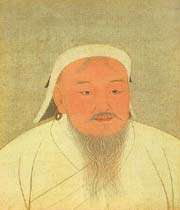Kublai Khan Becomes Ruler of the Mongol Empire (1260)
Kublai or Khubilai Khan (September 23, 1215[8] - February 18, 1294[9]) (Mongolian: Хубилай хаан, Chinese: 忽必烈; pinyin: Hūbìliè), was the fifth and last Khagan (1260–1294) of the Mongol Empire. In 1271, he founded the Yuan Dynasty, which ruled over Mongolia, China Proper, and some adjacent areas, and became the first Yuan emperor.
The second son of Tolui and Sorghaghtani Beki and grandson of Genghis Khan, Kublai Khan was a Mongol emperor who founded China's Yuan Dynasty and became the first Yuan emperor in 1271. In 1279, he completed his grandfather's conquest of China by overthrowing the Sung dynasty. He promoted economic prosperity by rebuilding the Grand Canal, repairing public granaries, extending highways, and encouraging foreign commerce.The civil war between him and his younger brother Ariq Böke over the succession of their older brother Möngke (died in 1259) essentially marked the end of a unified Mongol empire.

The empire consisted of four khanates, each ruled by a separate khan and overseen by the Great Khan. The Kipchak Khanate (also called the Golden Horde) ruled Russia; the Ilkhanate ruled the Middle East, the Chagatai Khanate ruled over central Asia, and the Great Khanate controlled Mongolia and eventually the whole of China. The empire reached its greatest extent under Kublai with his conquest of the Song Dynasty, which was completed by his final victory in the Battle of Yamen in 1279. However, by that time the empire had already partly fragmented, as most of the khanates did not recognize Kublai as the legitimate Great Khan.